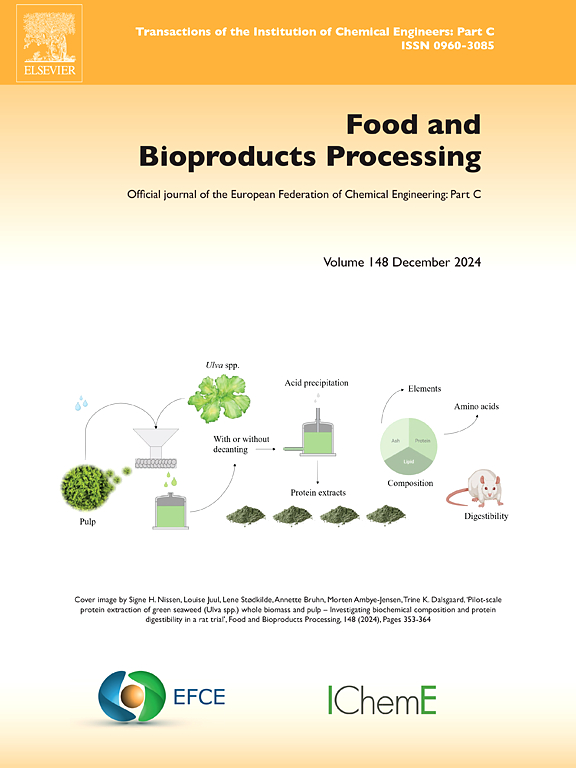Improve the energy efficiency of the fruit freeze-drying through the predictive analysis
IF 3.5
2区 农林科学
Q2 BIOTECHNOLOGY & APPLIED MICROBIOLOGY
引用次数: 0
Abstract
The considerable energy expenditure involved in the freeze-drying of foods justifies the development of innovative engineering techniques. Artificial intelligence will facilitate mass balance and energy efficiency in future food freeze-drying processes. This study assessed the energy and manufacturing efficiency of the freeze-drying facility through the application of artificial intelligence. Two distinct artificial neural network models were created utilizing real-time data from a factory located in an industrial zone that processed freeze-dried vegetables and kiwi fruit. Analyzing energy efficiency values and production was done using network models constructed from 20 experimental data sets. The Levenberg-Marquardt approach was employed to train neural networks with a multilayer perceptron architecture. The neural network models' prediction values were compared with the experimentally acquired data, and their performance was examined using several performance criteria. The evaluations carried out for 20 different scenarios revealed overall energy efficiency rates ranging from 25.8 % to 64.5 %. The considerable energy expenditure involved in the freeze-drying of foods justifies the development of innovative engineering techniques. Artificial intelligence will facilitate mass balance and energy efficiency in future food freeze-drying processes.
通过预测分析,提高水果冷冻干燥的能效
食品冷冻干燥所消耗的大量能量证明了创新工程技术的发展是合理的。人工智能将在未来的食品冷冻干燥过程中促进质量平衡和能源效率。本研究通过人工智能的应用对冻干设备的能源和制造效率进行了评估。两种不同的人工神经网络模型是利用位于工业区的一家加工冻干蔬菜和猕猴桃的工厂的实时数据创建的。利用20个实验数据集构建的网络模型对能效值和产量进行了分析。采用Levenberg-Marquardt方法训练具有多层感知器结构的神经网络。将神经网络模型的预测值与实验数据进行了比较,并采用几种性能标准对其性能进行了检验。对20种不同情景进行的评估显示,总体能源效率从25.8 %到64.5 %不等。食品冷冻干燥所消耗的大量能量证明了创新工程技术的发展是合理的。人工智能将在未来的食品冷冻干燥过程中促进质量平衡和能源效率。
本文章由计算机程序翻译,如有差异,请以英文原文为准。
求助全文
约1分钟内获得全文
求助全文
来源期刊

Food and Bioproducts Processing
工程技术-工程:化工
CiteScore
9.70
自引率
4.30%
发文量
115
审稿时长
24 days
期刊介绍:
Official Journal of the European Federation of Chemical Engineering:
Part C
FBP aims to be the principal international journal for publication of high quality, original papers in the branches of engineering and science dedicated to the safe processing of biological products. It is the only journal to exploit the synergy between biotechnology, bioprocessing and food engineering.
Papers showing how research results can be used in engineering design, and accounts of experimental or theoretical research work bringing new perspectives to established principles, highlighting unsolved problems or indicating directions for future research, are particularly welcome. Contributions that deal with new developments in equipment or processes and that can be given quantitative expression are encouraged. The journal is especially interested in papers that extend the boundaries of food and bioproducts processing.
The journal has a strong emphasis on the interface between engineering and food or bioproducts. Papers that are not likely to be published are those:
• Primarily concerned with food formulation
• That use experimental design techniques to obtain response surfaces but gain little insight from them
• That are empirical and ignore established mechanistic models, e.g., empirical drying curves
• That are primarily concerned about sensory evaluation and colour
• Concern the extraction, encapsulation and/or antioxidant activity of a specific biological material without providing insight that could be applied to a similar but different material,
• Containing only chemical analyses of biological materials.
 求助内容:
求助内容: 应助结果提醒方式:
应助结果提醒方式:


